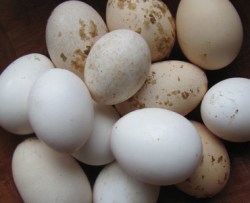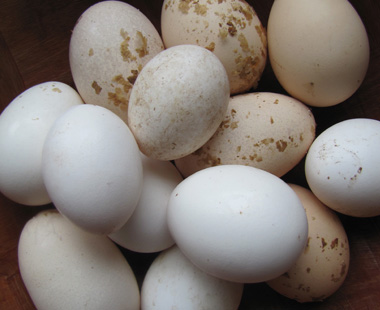 In 2008, California voters approved Proposition 2, a ballot initiative that established stricter guidelines for treatment of animals in the poultry and veal industries. Most notably, the measure eliminated the use of “battery cages” for laying hens, small cages crammed with birds who are often unable to even stand. Prop 2 passed by a nearly 2-to-1 margin, despite strong opposition from egg producers across the country.
In 2008, California voters approved Proposition 2, a ballot initiative that established stricter guidelines for treatment of animals in the poultry and veal industries. Most notably, the measure eliminated the use of “battery cages” for laying hens, small cages crammed with birds who are often unable to even stand. Prop 2 passed by a nearly 2-to-1 margin, despite strong opposition from egg producers across the country.
Though full enforcement of the battery cage ban wasn’t mandated until 2015, many producers didn’t wait to make changes. Some moved out of state. Others implemented the changes early.
A group of egg producers in this latter category have joined an unexpected crusade: a push to enact rules similar to those in Prop 2 nationally. The Los Angeles Times looked at this unexpected effort last month:
In a rare alliance, the Humane Society of the United States and egg ranchers have joined forces to lobby for federal legislation that would set national standards for egg ranches similar to those implemented at JS West [a California producer that met the Proposition 2 standards early].
“No question about it: Proposition 2 was a major wake-up call to the entire U.S. egg industry,” said Chad Gregory, senior vice president of United Egg Producers, a trade organization that represents most of the nation’s egg farmers.
That effort may come to fruition in the farm bill, omnibus agriculture legislation currently in front of the Senate (which you can learn more about here). Food Safety News reports that Sen. Dianne Feinstein (D-Calif.) has lined up a dozen senators to back an amendment to the proposed bill which would “double the space given to each of the nation’s more than 250 million egg-laying hens by phasing in enriched colony housing that allow the hens to express natural behaviors like perching and nesting.”
It’s not clear how the measure will fare on the Senate floor, particularly with over 90 proposed amendments to the farm bill under consideration. Still, proponents are optimistic.
“It’s my hope that Senators break free of the old paradigm — animal advocates versus agriculture industries — and recognize that this solution serves all parties, especially consumers,” said Wayne Pacelle, president and CEO of HSUS. “Failure to enact this provision will mean that the egg industry and animal advocates will go back to costly state-by-state battles that will slow down progress, cost both sides hundreds of millions of dollars, and leave all parties with uncertain outcomes.”
Pacelle had more passion when he explained his desired outcome to the Times.
The federal legislation provides a pathway to give the birds a much better life. … It’s not perfect, but it is a dramatic improvement.




